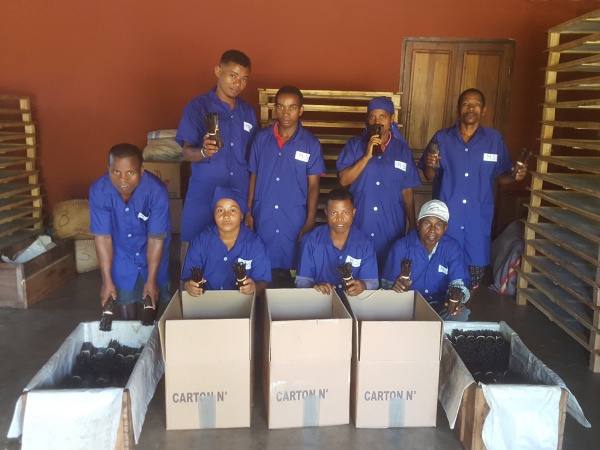Difference between revisions of "Madagascar Spices"
CampMaster (talk | contribs) (Tags: Mobile edit, Mobile web edit) |
CampMaster (talk | contribs) |
||
| Line 3: | Line 3: | ||
[[File:Madagascar_Spices_014.jpg|600px]] | [[File:Madagascar_Spices_014.jpg|600px]] | ||
| − | Dylan's grandfather, Toto, was the first in his family working on vanilla plantations, supplying French traders. Dylan's father, Venja, continued supplying | + | Dylan's grandfather, Toto, was the first in his family working on vanilla plantations, supplying French traders. Dylan's father, Venja, continued supplying French traders. Shortly after Madagascar's independence in 1960, the vanilla trade became dominated by Chinese immigrants who had previously worked on French owned plantations. The Chinese became buyers and exporters of vanilla and were Venja's newfound customers. Venja's wife, Bavy, took care of hand pollinating the vanilla orchids at their family owned plantation 15km north west of Andapa. Today, Madagascar Spices cultivates, processes and exports vanilla directly to its customers. |
{| class="imageTable" | {| class="imageTable" | ||
| Line 17: | Line 17: | ||
From a young age of 15, Dylan literary followed his parents footsteps to the vanilla plantation on a daily basis. He is one of 10 children and the only son in the family to have continued his passion for vanilla in his professional life. | From a young age of 15, Dylan literary followed his parents footsteps to the vanilla plantation on a daily basis. He is one of 10 children and the only son in the family to have continued his passion for vanilla in his professional life. | ||
| − | The three hectares plantation located close to Andapa has about 1,000 plants which produces maximum five | + | The three hectares plantation located close to [[Andapa]] has about 1,000 plants which produces maximum five |
tons of mainly Bourbon and Thahiti vanilla each year. Additionally, some Pompona as well as some Mangitsy Ampotony is grown, but which is not intended as a premium export product as it has a lower vanillin content. | tons of mainly Bourbon and Thahiti vanilla each year. Additionally, some Pompona as well as some Mangitsy Ampotony is grown, but which is not intended as a premium export product as it has a lower vanillin content. | ||
[[File:Madagascar Spices 030.jpg|600px]] | [[File:Madagascar Spices 030.jpg|600px]] | ||
| − | In 2015, Dylan started a farmers cooperative named ''Madagascar Natural Products'', or MNP for short. The cooperarive provides agricultural training and equipment to its members, such as flashlights and raincoats when needed. Through education and support, MNP's objective is to help its member farmers grow the highest quality gourmet vanilla. As of 2017, there are four member families with eight individual farmers each. In total, 32 farmers located in areas stretching from and around Andapa to Sambava are part of the cooperative. | + | In 2015, Dylan started a farmers cooperative named ''Madagascar Natural Products'', or ''MNP'' for short. The cooperarive provides agricultural training and equipment to its members, such as flashlights and raincoats when needed. Through education and support, MNP's objective is to help its member farmers grow the highest quality gourmet vanilla. As of 2017, there are four member families with eight individual farmers each. In total, 32 farmers located in areas stretching from and around Andapa to [[Sambava]] are part of the cooperative. |
{| class="imageTable" | {| class="imageTable" | ||
| Line 34: | Line 34: | ||
|} | |} | ||
| − | During the vanilla processing season from June until August Madagascar Spices has 25 staff members in Andapa and 10 in Sambava. The 20th June is the official start of harvesting. The processing, or so-called curing process of each vanilla pod, takes approximately one month. This includes cooking the pods to retain the aroma for longer, drying, sorting and packaging. The vanilla is then ready for export. Madagascar Spices takes great pride in their end-products that is achived through the highly laborous process from hand-pollination to packaging. Additionally, their products are 100% organic with no use of artificial fertilisers. The company accepts small and large orders with the smallest shipment being 2kg, which can be sent worldwide by DHL or FedEx. | + | During the vanilla processing season from June until August Madagascar Spices has 25 staff members in Andapa and 10 in Sambava. The 20th June is the official start of harvesting. The processing, or so-called curing process of each vanilla pod, takes approximately one month. This includes cooking the pods to retain the aroma for longer, drying, sorting and packaging. The vanilla is then ready for export. Madagascar Spices takes great pride in their end-products that is achived through the highly laborous process from hand-pollination to packaging. Additionally, their products are 100% organic with no use of artificial fertilisers. The company accepts small and large orders with the smallest shipment being 2kg, which can be sent worldwide by [[DHL Sambava|DHL]] or FedEx. |
Dylan can be reached via email [mailto:spices2015.company@gmail.com spices2015.company@gmail.com] and [mailto:dylan.randriamihaja@yahoo.fr dylan.randriamihaja@yahoo.fr] | Dylan can be reached via email [mailto:spices2015.company@gmail.com spices2015.company@gmail.com] and [mailto:dylan.randriamihaja@yahoo.fr dylan.randriamihaja@yahoo.fr] | ||
View all [[Madagascar Spices photos]] | View all [[Madagascar Spices photos]] | ||
Revision as of 18:05, 8 January 2017
Madagascar Spices is a vanilla plantation and producer in Andapa with a processing facility in Sambava. While the company was started by Dylan Randriamihaja in 2015 and began exporting directly to Europe and Canada in the same year, his family has been farming and producing high quality vanilla beans for sale via local distributors and exporters since 1910.
Dylan's grandfather, Toto, was the first in his family working on vanilla plantations, supplying French traders. Dylan's father, Venja, continued supplying French traders. Shortly after Madagascar's independence in 1960, the vanilla trade became dominated by Chinese immigrants who had previously worked on French owned plantations. The Chinese became buyers and exporters of vanilla and were Venja's newfound customers. Venja's wife, Bavy, took care of hand pollinating the vanilla orchids at their family owned plantation 15km north west of Andapa. Today, Madagascar Spices cultivates, processes and exports vanilla directly to its customers.
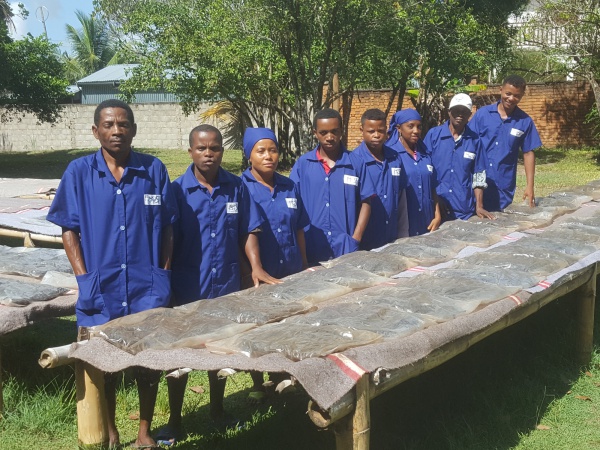
| ||

|
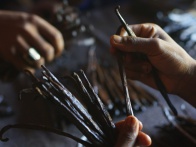
|
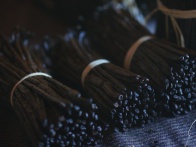
|
From a young age of 15, Dylan literary followed his parents footsteps to the vanilla plantation on a daily basis. He is one of 10 children and the only son in the family to have continued his passion for vanilla in his professional life.
The three hectares plantation located close to Andapa has about 1,000 plants which produces maximum five tons of mainly Bourbon and Thahiti vanilla each year. Additionally, some Pompona as well as some Mangitsy Ampotony is grown, but which is not intended as a premium export product as it has a lower vanillin content.
In 2015, Dylan started a farmers cooperative named Madagascar Natural Products, or MNP for short. The cooperarive provides agricultural training and equipment to its members, such as flashlights and raincoats when needed. Through education and support, MNP's objective is to help its member farmers grow the highest quality gourmet vanilla. As of 2017, there are four member families with eight individual farmers each. In total, 32 farmers located in areas stretching from and around Andapa to Sambava are part of the cooperative.
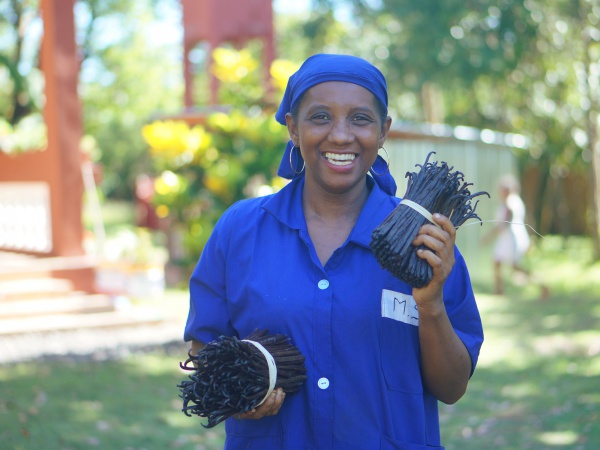
| ||
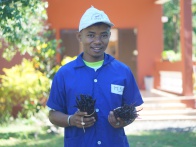
|
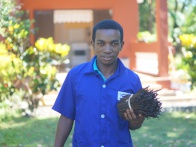
|

|
During the vanilla processing season from June until August Madagascar Spices has 25 staff members in Andapa and 10 in Sambava. The 20th June is the official start of harvesting. The processing, or so-called curing process of each vanilla pod, takes approximately one month. This includes cooking the pods to retain the aroma for longer, drying, sorting and packaging. The vanilla is then ready for export. Madagascar Spices takes great pride in their end-products that is achived through the highly laborous process from hand-pollination to packaging. Additionally, their products are 100% organic with no use of artificial fertilisers. The company accepts small and large orders with the smallest shipment being 2kg, which can be sent worldwide by DHL or FedEx.
Dylan can be reached via email spices2015.company@gmail.com and dylan.randriamihaja@yahoo.fr
View all Madagascar Spices photos

